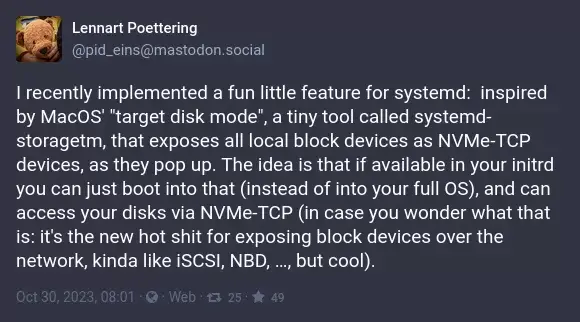this post was submitted on 31 Oct 2023
328 points (95.6% liked)
Linux
50208 readers
1242 users here now
From Wikipedia, the free encyclopedia
Linux is a family of open source Unix-like operating systems based on the Linux kernel, an operating system kernel first released on September 17, 1991 by Linus Torvalds. Linux is typically packaged in a Linux distribution (or distro for short).
Distributions include the Linux kernel and supporting system software and libraries, many of which are provided by the GNU Project. Many Linux distributions use the word "Linux" in their name, but the Free Software Foundation uses the name GNU/Linux to emphasize the importance of GNU software, causing some controversy.
Rules
- Posts must be relevant to operating systems running the Linux kernel. GNU/Linux or otherwise.
- No misinformation
- No NSFW content
- No hate speech, bigotry, etc
Related Communities
Community icon by Alpár-Etele Méder, licensed under CC BY 3.0
founded 5 years ago
MODERATORS
you are viewing a single comment's thread
view the rest of the comments
view the rest of the comments

I'm happy that this is coming to linux (I believe Nutanix has a great method to expose storage over IPs), but I would have liked if this was a bit more project/dependence agnostic.
I mean, it specifically is giving support for booting disks over an existing protocol to systemd. That's pretty well within scope?
Oh, my gripe is not with Poettering creating a systemd service for it (for I cannot dispute that systemd wrappers such as this does make life somewhat easier), but I would have liked perhaps a more distribution agnostic method of running NVMe-TCP in a way that the OS would not have to be booted. I suppose I do understand the community's support for this: systemd is used by most of the popular distributions, and writing a service in it will enable systemd to maybe interleave this between other processes and perhaps fulfill the goal of producing a block device on an L3 network without booting userland.
As one can probably surmise, I do not have a great understanding of how the process works - will have to figure out how MacOS did it first, and then about how Poettering implemented it. I think I'll have a better idea of what the solution is geared towards.
Thanks for your comment!
From the pull request:
I think that's as minimal a boot target as you can reasonably get, or in other words you're as far away from booting the OS as you can get.
So now the question is whether this uses any systemd-specific interfaces beyond the .service and .target files. If not, it should not take much effort to create a wrapper init script for the executable and run it on non systemd distros.
Thanks, that makes it easy to understand. Indeed, it doesn't seem very dependent on systemd, which is great. I was aware that the project existed, and for a second thought that Poettering was trying to integrate it directly within systemd somehow whilst making improvements to it. I suppose that's not the case, which is good.
And you're correct, that is probably the easiest way to boot the minimum required resources.
Thanks.
"Magic was meant to serve men, never to rule over them."
Pragmatism > all else.